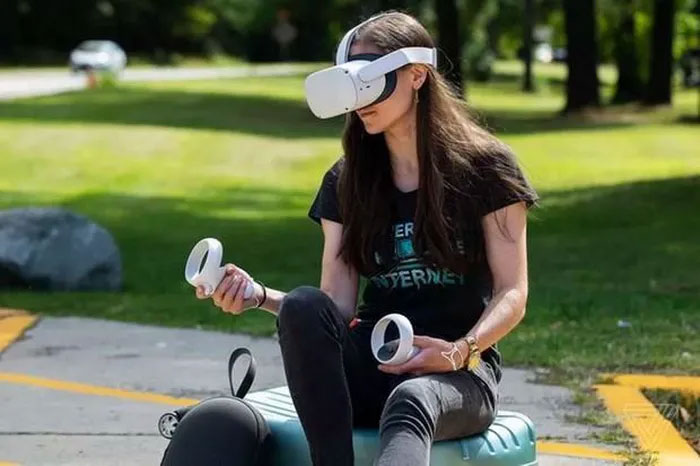The Covid-19 pandemic has had a significant impact on the world, particularly on healthcare systems. Numerous studies indicate that frontline healthcare workers combating the pandemic have consistently faced stress, anxiety, and fatigue, experiencing severe mental strain as well as physical exhaustion throughout the two years of the outbreak.
To alleviate stress for healthcare staff, especially in facilities treating Covid-19 patients, researchers in Ohio, USA, have discovered a relatively inexpensive and easy-to-implement method: the use of virtual reality technology.

Virtual reality technology provides moments of relaxation for frontline healthcare workers combating Covid-19. (Source: theverge.com).
Just a brief 3-minute break to enjoy a simulated serene natural environment through this technology can significantly reduce stress for users.
According to the GRID laboratory at Ohio University, one of the institutions involved in the research, the team created a 3-minute video showcasing the scenery of a nature reserve in southeastern Ohio.
This reserve is lush, vibrant, and notably tranquil. The filming technology is compatible with virtual reality, allowing users to feel as if they are truly standing in a verdant natural environment, walking around and observing in different directions, thus immersing themselves in the beauty of nature while listening to the sounds of birds and the breeze.
Although this is just a short experience, research results indicate that this method is effective.
The researchers tested this approach on 102 volunteers working in three different healthcare facilities treating Covid-19 patients, as well as individuals in various other professions, from those directly caring for Covid-19 patients to administrative staff. The researchers noted a significant reduction in stress levels among the users.
Volunteers were asked to rate their stress levels on a scale from 1 to 10 before and after using the virtual reality technology. Before viewing the 3-minute video, their average stress level was around 5.5.
However, after experiencing the technology, this figure dropped to 3.3. Specifically, among healthcare workers, who were assessed to have the highest stress levels, the reduction was even more pronounced, decreasing from an average of 6.8 to 3.9.
Given these results, the researchers believe that using virtual reality technology to provide moments of relaxation for frontline healthcare workers combating Covid-19 is feasible due to its relatively low cost and ease of implementation in the workplace.
However, researchers are uncertain how long the effects of this technology will last, indicating that further study is needed to determine whether the simulated verdant natural environment can help users reduce stress in the long term.
This study was published in a recent issue of the journal PLOS ONE.

















































